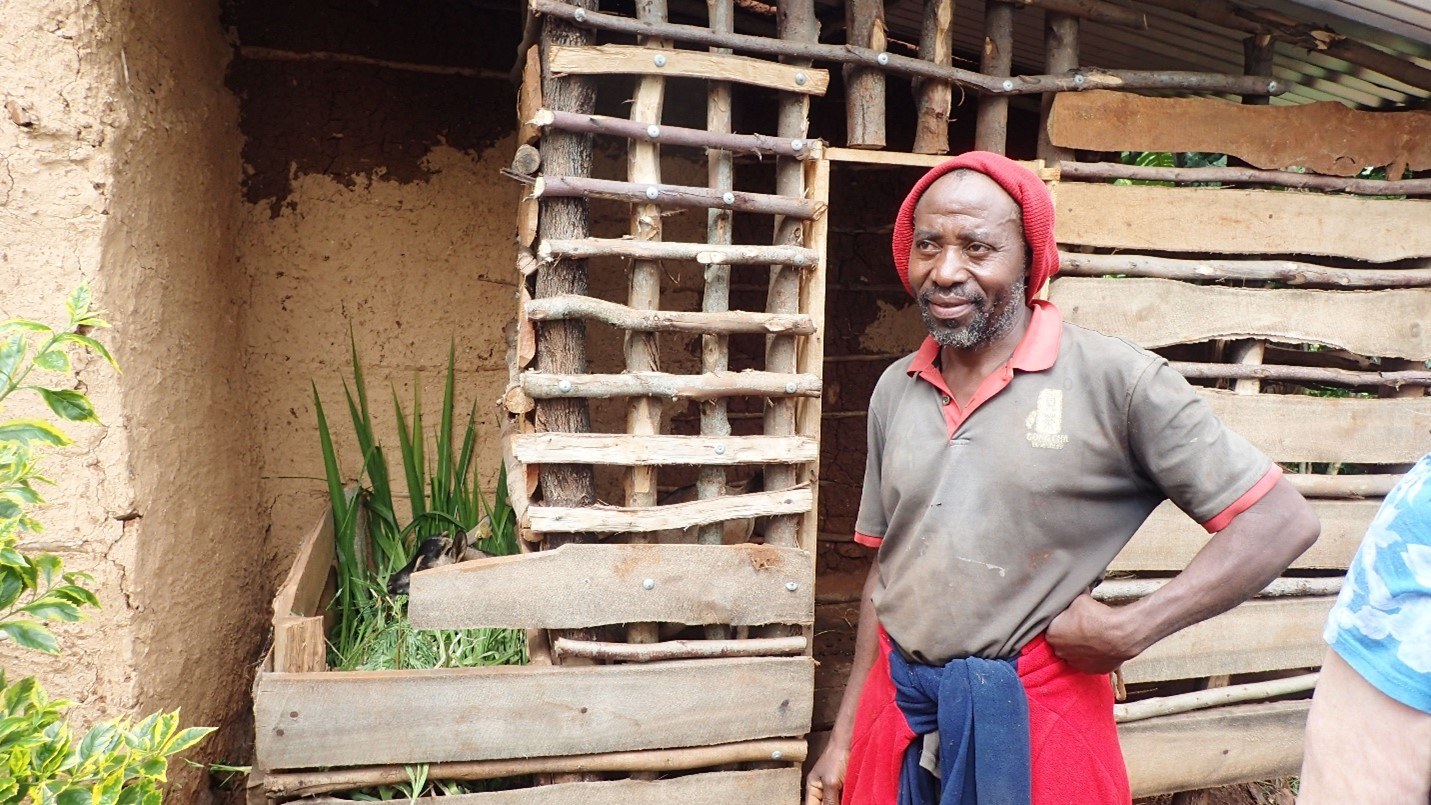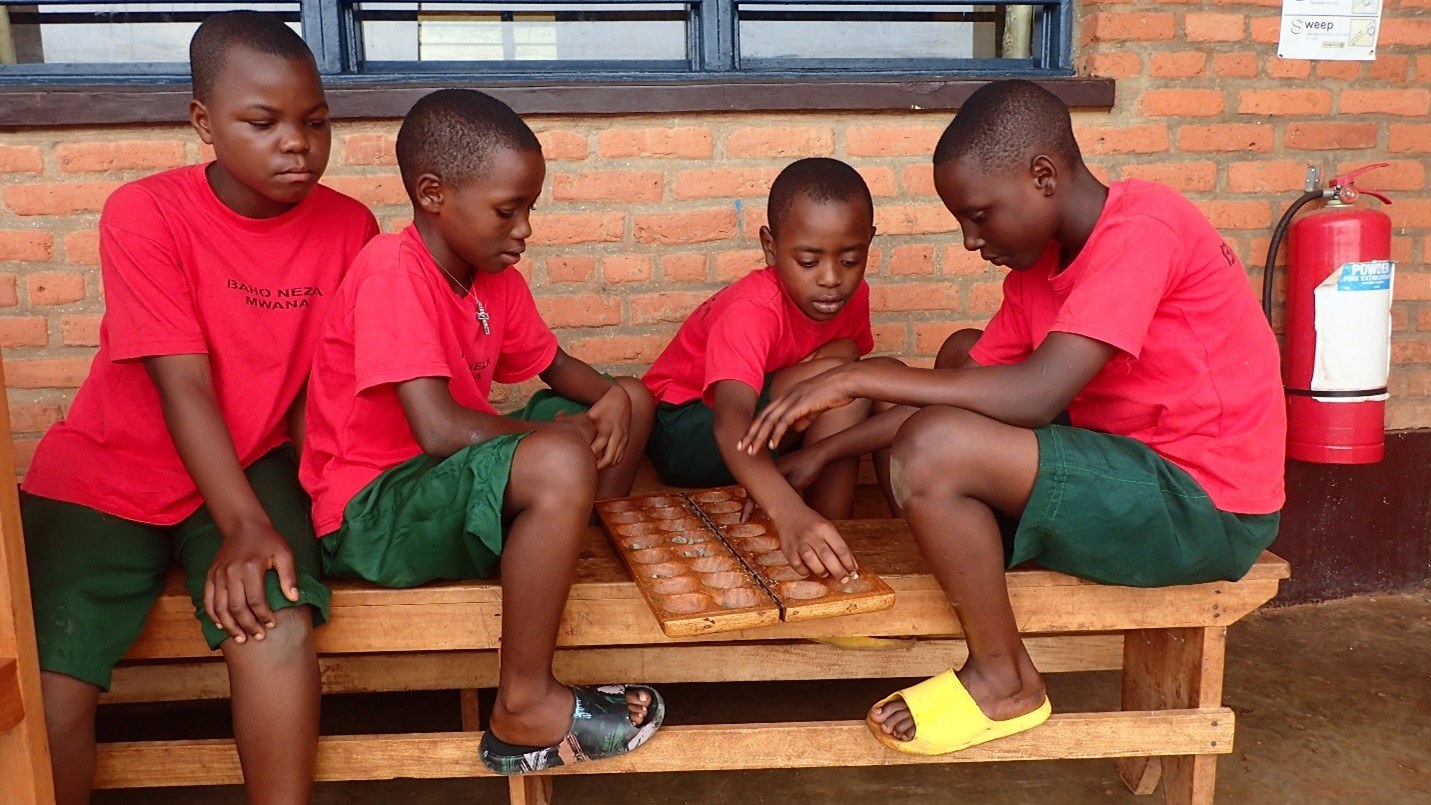I am sitting in the Alivera Centre writing this, at the end of another very busy trip to Rwanda. Listening to the children returning from school for lunch, along with the trainees from the Alivera Village, it is impossible not to be lifted by their energy. The joyful atmosphere is a reminder of the remarkable achievements of Felix and his team here, and of your continued support and interest in Rwanda Action’s work.

Children arriving home for lunch at the Alivera Centre
Trainees at the Village are gaining work experience in the shoemaking, carpentry, sewing and knitting workshops and also learning hairdressing and office services. These include printing and photocopying, as well as helping local people submit official documents, pay taxes, apply for identity cards etc. These services, which our trainees help provide to local people in Ntendezi, were not available before we built the Village. I have also seen great improvements in our café during this trip, where our manager Jeanette is teaching trainees customer service and kitchen skills in a lively atmosphere.
The Alivera Project may have been designed around the needs of children and young adults living with disability, but it is thriving on their abilities and celebrating individuality. The educational opportunities, work skills and experience gained are due to the eagerness of those young people working positively with our teachers and business cooperatives. It is wonderful to see the impact that this is having on their families and the local community. Their successes are changing hearts and minds when it comes to disability and inclusion.
Hairdressing apprentices practising on a dummy head of hair
Over the years we have worked with Ntendezi primary school, nearby the Alivera Centre, to enable children with disabilities to access mainstream school. The children stay at the Centre during term time and attend school, thanks to generous supporters who made access to classrooms and toilets possible, supported staff development and provided equipment. The school is attracting interest from across the country as a School of Excellence for Special Needs and Inclusive Education (SESNIE). Our long-term aim has always been for children to stay with their families and go to local schools and in 2024 we are taking huge strides towards this becoming a reality for many children.
We have selected one teacher in each sector of Nyamasheke to become a Special Educational Needs Coordinator (SENCO). We held their first residential training course during the Christmas holidays and Felix is monitoring their progress as they begin sharing what they have learnt with colleagues. Our aim is to develop one SESNIE in each of the 15 sectors of Nyamasheke district over the next couple of years. Local government officials are so convinced by this programme that they are part funding.
We are now hoping to secure funding to roll this programme out in the 18 sectors of Rusizi district. This is a significant shift towards reducing the provision of residential care and enabling access to inclusive education close to children’s family homes. The Rwandan government is developing an inclusive education policy and this project is already demonstrating how to deliver it in government schools.
Our Education team has been key to the development of the inclusive education programme, whilst continuing to deliver Continuing Professional Development to Lead Teachers and School Based Teacher Mentors in each of the 33 sectors. At the end of 2023, we analysed data from the first two years of the Learning Initiative project, which was extremely encouraging. By adopting a student-centred approach and teaching at the right level, we are seeing improvements in examination results and a reduction in dropout rates in primary schools. We hope that these results will further strengthen our working relationship with the Rwanda Education Board.

A farmer in Rugabano in front of his goat pen
During this visit I have also been able to catch up on some of our community initiatives and our dairy goat farm, as well as enjoying the wonderful oyster mushrooms we are now producing. We have trained 75 farmers in Rugabano cell in crop and livestock management and we are in the process of selecting another 75 farmers in Save cell. Once trained the farmers were supported with materials to build goat pens and then each farmer was given a goat, all of which are now in kid. The farmers work together in associations and we have also rented land for three years for each of the five associations in Rugabano and they are now planting crops for the second planting season of the year.
We also set up ten enterprise groups in Rugabano and Save cells. Most of the 115 members were unemployed youth and the groups have now been equipped and trained in their own workshops, which we rented for six months. Their businesses include tailoring, shoemaking, hairdressing and a bakery and it was wonderful to visit some of them and hear how things are going. By working with communities, we are able to show how supporting farm and off-farm enterprises contributes to improving micro-economies in villages. An additional six tree nurseries were also established over the past year and 170,000 trees have now been grown and distributed. These provide fruits, shade, soil stability, carbon sequestration, building materials, fuel and help to improve soil quality. We are hoping to fundraise to deliver a similar number of trees in 2024.

Sewing enterprise group in Rugabano
A visit to Odette at the Saturday club for vulnerable local children is a must during my visits although I gave up trying to join in the traditional drumming and dancing lessons long ago! It was great to find that girls have now joined the programme, through which children are also supported with school fees and materials, help with homework and counselling. On top of this, a hearty lunch, playing games and making new friends keeps attendance high.

I am leaving Kamembe brimming with pride and confidence in our team. Under the careful management of our new Country Director, Alex Omoit, there is an energetic and positive atmosphere. Alex has worked for Rwanda Action since 2011 and has led our Education programme and worked with teachers from the UK with unwavering enthusiasm and dedication. His excellent management produced our project managers, Isaac and Felix, who were both promoted from the Education team. Halfway through this year’s action plan, not only is every project on course, but we have expanded the programme. In Finance and Administration, the team has embraced new systems, which will improve our collaborative working.
Whenever I leave Rwanda, team members always ask me to send greetings to our supporters so I will sign off with our heartfelt thanks for making our work in Rwanda possible.
Janyis Watson, CEO
